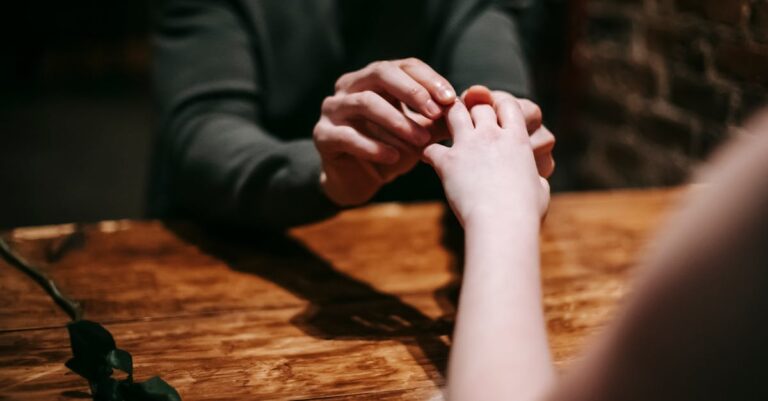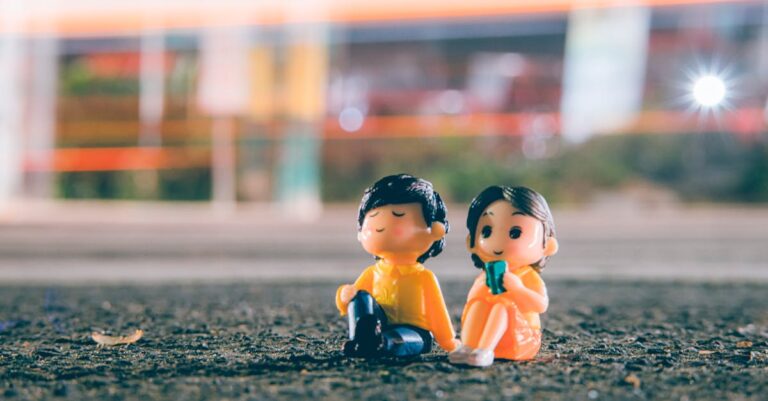
The air smelled of pine resin and rain as Clara stepped off the bus, her boots crunching on gravel. The town of Silver Hollow hadn’t changed—same crooked sidewalks, same flickering streetlamp casting long shadows across the diner’s parking lot. She’d left nine years ago, chasing a dream that dissolved like sugar in coffee. Now, the weight of her suitcase felt heavier than ever.
The diner’s bell jingled as she pushed through the door. The scent of fried eggs and burnt toast hit her, sharp and familiar. At the counter, a man with his back to her leaned against the chrome, a cup of black coffee steaming in front of him. Something about the way he held his shoulders—tense, like a coiled wire—made her pause. She’d recognize that posture anywhere.
“Clara?” His voice was lower than she remembered, roughened by time and maybe whiskey. She turned, her pulse a faint drumbeat in her ears. Jack. His dark hair was shorter, his jaw more defined, but the green eyes—those remained, sharp as a hawk’s.
She forced a smile. “Hey, Jack.” The word felt foreign, like a key turned in a lock that hadn’t been used in years.
He pushed off the counter, coming toward her. The scent of his cologne was cedar and something sweeter, maybe vanilla. “I didn’t think you’d come back.” His hand hovered near her arm, then dropped. “Not after…”
“After what?” she asked, too quick. The silence between them stretched, thick as sap.
He looked past her, toward the window where the sun slanted through the blinds. “You left. Without a word.” His voice was steady, but his fingers twitched against his thigh.
Clara’s throat tightened. She’d been sixteen, desperate to escape the town’s whispers about her mother’s illness, about the way Clara had stayed up nights listening to her wheeze. She’d taken a bus to Seattle, never looking back. “I had to go,” she said, but the words felt hollow.
Jack exhaled, a slow, measured breath. “You could’ve told me.” His gaze met hers, and for a moment, the diner faded—a memory of summer nights in the woods, her laughter tangled with his as they chased fireflies. She’d thought he was safe. Thought he’d wait.
“I didn’t think you’d care,” she admitted, the confession scraping her throat raw.
His expression shifted, something vulnerable flickering across his face. “I did.” He reached out, fingers brushing hers, and the touch was like a spark jumping a gap. “I always did.”
The bell jingled again, breaking the moment. Clara pulled her hand back, her heart a frantic bird in her chest. “I should go,” she said, but her feet stayed rooted. The diner’s din—the clatter of dishes, the low hum of conversation—felt like a distant echo.
Jack didn’t let go. “Stay. Just… talk.” His voice was quiet, but it cut through the noise like a knife.
She hesitated, the weight of years pressing down. Then she nodded. The seat creaked as she sank into it, the leather warm from his body heat. The coffee was bitter, but she drank it anyway, savoring the sharpness. It was the same brand her mother used to brew, strong enough to wake the dead.
“You’re still here,” she said, staring at the steam curling from her cup.
“You’re still running,” he countered. His fingers tapped a rhythm on the counter—short, steady, like a heartbeat.
A laugh escaped her, unexpected and light. “Is that what you think?”
“It’s what I know.” He tilted his head, studying her. “You left because you were scared. But you came back because you’re not anymore.”
Clara looked away, the words settling in her chest like a stone. She’d told herself she was here for the job—a graphic design gig in the next town over—but the truth was messier. She’d missed the way the pines whispered in the wind, missed the silence that didn’t feel empty. Missed him.
“What if I’m not ready?” she asked, her voice barely above a whisper.
Jack reached for her hand again, his palm rough but gentle. “Then we take it slow.”
The bell jingled once more, and the moment stretched, taut as a bowstring. Clara met his gaze, and for the first time in years, she didn’t feel alone.
—
The next morning, the town was wrapped in fog, the streets hushed under a gray sky. Clara stood at the edge of the forest, her breath visible in the cold air. Jack walked beside her, his boots crunching on fallen leaves. The path was familiar—marked by the time they’d once carved their initials into a birch tree, now weathered and faded.
“You remember this place,” he said, his voice low.
“How could I forget?” she replied, glancing at the tree. The initials were barely legible, but the memory was sharp: her hands trembling as she carved them, Jack laughing as he held her steady. They’d been so young, so sure of everything.
He stopped, turning to face her. “You never told me why you left.”
Clara’s throat tightened. The words had been stuck there for years, tangled in the same way the roots of the pines coiled beneath the soil. “My mom… she got sick. I couldn’t handle it. I thought if I left, I’d be free.” Her voice wavered. “But I was just running from everything.”
Jack’s eyes darkened, not with anger, but something deeper. “You didn’t have to do it alone.”
She looked at him, really looked—how the lines around his eyes had deepened, how his smile was softer now. “I know. I’m sorry.” The words felt like a weight lifting, even as they left her lips.
He reached out, brushing a strand of hair from her face. “It’s okay. We’re here now.”
The fog lifted slightly, revealing the forest beyond. Clara took a shaky breath, the cold air filling her lungs. “What if we mess this up?”
“Then we try again,” he said simply. “We always do.”
She smiled, a real one this time, and stepped closer. The world felt quieter here, as if the trees were holding their breath. When Jack kissed her, it was slow and deliberate, like the first light of dawn breaking over the hills. His lips were warm, his hands steady on her back. It wasn’t the frantic passion of their youth—it was something softer, steadier.
When they pulled apart, Clara rested her forehead against his chest, listening to the steady rhythm of his heartbeat. “I missed this,” she murmured.
“I missed you,” he replied, his voice a rumble in his chest. “Every single day.”
They stood there for a long time, the forest around them untouched by time. The past was still there, woven into the roots and the air, but for the first time in years, Clara didn’t feel trapped by it. She was here, with him, and that was enough.
—
The weeks that followed were a blur of quiet moments—a shared coffee at the diner, long walks through the woods, the way Jack’s laugh echoed in the silence. They didn’t rush things, didn’t try to fill every gap. Instead, they let the space between them be filled with understanding.
One evening, as the sun dipped below the horizon, painting the sky in hues of orange and purple, Clara and Jack sat on the porch of her rented cabin. The air was cool, carrying the scent of pine and woodsmoke. She leaned against him, his arm around her shoulders, and watched the fireflies flicker in the distance.
“You know,” she said, breaking the silence, “I used to think this town was a prison.”
Jack chuckled, the sound low and warm. “And now?”
“Now I think it’s a home.” She tilted her head, meeting his gaze. “Even if it’s not the one I expected.”
He smiled, something tender in his eyes. “That’s okay. Home isn’t always where you plan to be. It’s where you end up.”
Clara felt a pang of something—hope, maybe, or relief. She didn’t know how long this would last, but for now, it was enough. The past was behind them, and the future was still unwritten.
As the stars began to pierce the darkening sky, Clara nestled closer, content in the quiet. The forest whispered around them, a soft lullaby of leaves and wind. And for the first time in a long time, she felt at peace.


